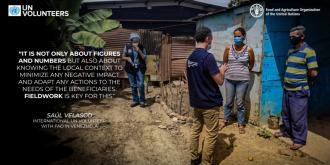"One month after my arrival in Caracas, the COVID-19 crisis began," UN Volunteer Saúl Velasco, from Spain, tells us. "The lockdown established in the country for health reasons made us change our routines, but we all did our best to adapt.” Saúl had just been assigned as a Monitoring, Evaluation, Accountability and Learning Associate at the Food and Agriculture Organization of the United Nations (FAO) in Venezuela. This was his first experience within a UN agency, after having worked previously in Spain, Luxembourg and beyond, in the preparation of statistical studies for the European Union (EU) and government offices.
Saúl arrived in South America full of enthusiasm for this project. He was eager to put his professional and educational background in applied social research and data analysis at the service of achieving the Sustainable Development Goals (SDG), especially, SDG2, achieving zero hunger. As part of the Resilience and Emergency Team within FAO, Saúl loved the idea of being able to contribute to increasing agricultural production with a resilient approach, emphasizing collaboration with vulnerable rural communities. The goal of this programme is to guarantee the country’s sovereignty and food security.
"All the projects carried out by the agency aim to increase the resilience of people and enhance their livelihoods. In particular, FAO is participating in the Global Network Against Food Crises, an international project launched by the EU, FAO and the World Food Programme (WFP) during the 2016 World Humanitarian Summit," Saúl explains. "We intend to reach 3,800 agricultural households distributed in various states."
Saúl also highlights how he was given the possibility to collaborate on other projects within FAO, ensuring that decisions were guided by real data and evidence and that accountability to the affected population was at the center of the agency's activity in Venezuela. "We must be able to ensure that aid is received by those who need it most," he affirms. "It is not only about figures and numbers but also about knowing the local context to minimize any negative impact and adapt any actions to the needs of the beneficiaries. Fieldwork is key for this."
Already during his first month on the ground, this UN Volunteer contributed to the planning and set up of arrangements to launch baseline data collection for the Global Network Against Food Crisis project. "This includes developing a data collection questionnaire, as well as defining the sampling strategy, traveling and logistic arrangements and capacity building activities," Saúl describes.
With the advent of mobility restrictions imposed by the pandemic, many things changed for the members of Saúl's team and the rest of the people serving at FAO. Forced to work from home, online calls and a more flexible approach to work became part of their daily life. "In addition, we had to redesign our projects and reformulate their lines of action to adapt our response to the new needs of the local population," he says. "Food security is a priority, and meeting the nutritional needs of people in situations of vulnerability is now more important than ever."
As a positive element in the midst of that challenging situation, Saúl highlights the powerful team spirit prevailing in the agency, as well as the willingness of all its members to do everything possible to continue fulfilling their mission. "We were in touch by email and social media, which allowed us to communicate, learn from and support each other over that period," he shares. "In the end, we were able to meet and overcome this challenge together. Once the lockdown ended, being able to move around the country and work on the ground was a relief, after nine months in an apartment in Caracas, but these adverse circumstances made me appreciate more the importance of staying motivated and having such inspiring colleagues."
This article was prepared with the kind support of Online Volunteer José María Sainz Maza del Olmo.

